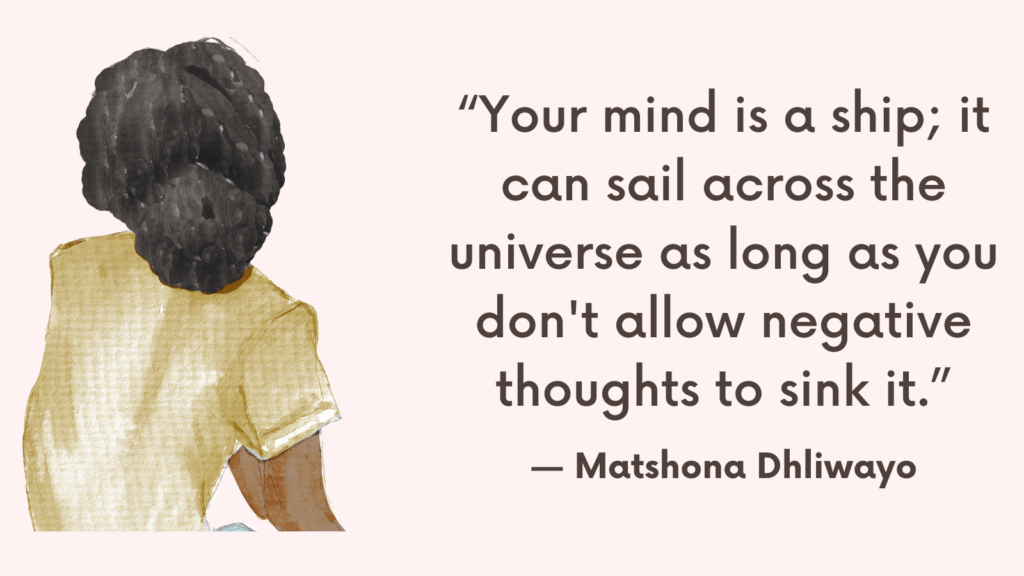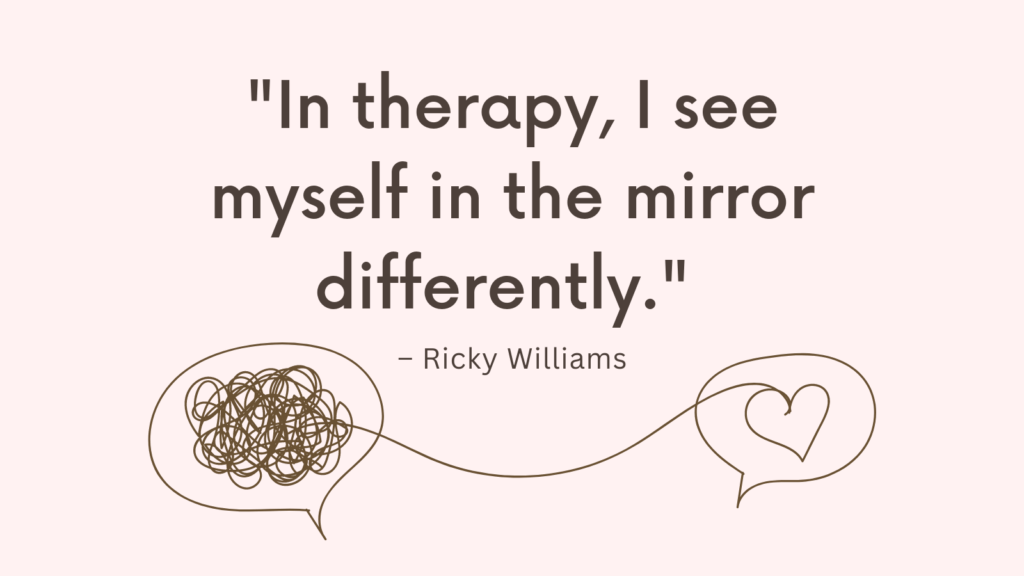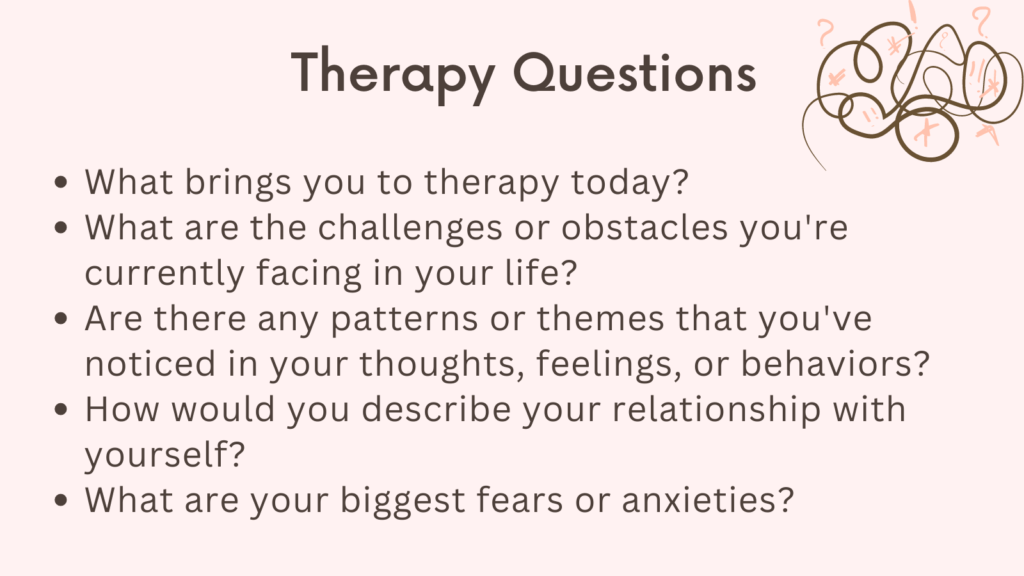In this post, you’re going to learn how to overcome fear of therapy.
Why Do People Fear Therapy?
People fear therapy for a variety of reasons. Here are some common reasons why people might fear therapy:
1. Social Stigma
There’s still a significant stigma attached to mental health issues and seeking therapy in many cultures and communities.
People may fear being judged as weak, unstable, or incapable if they admit to seeing a therapist.
2. Fear of Judgment
Individuals often worry about what others will think if they find out they are in therapy.
This includes concerns about how it might affect their relationships, employment, and social standing.
3. Avoidance of Pain
Therapy often involves delving into painful, uncomfortable emotions or traumatic experiences.
The prospect of facing these feelings head-on can be daunting for many.
Related: What To Talk To Therapist About: Top 35 Topics
4. Overwhelming Emotions
Some fear that therapy will open a Pandora’s box of emotions that they won’t be able to manage, leading to greater distress.
5. Misunderstanding the Process
There are many misconceptions about what therapy involves, fueled by media portrayals and hearsay.
Some people fear being judged, analyzed, or manipulated by a therapist.
7. Beliefs About Effectiveness
Skepticism about the effectiveness of therapy can also be a barrier.
Some may believe that talking about their problems won’t solve anything or that therapy is a sign of failure in solving one’s own problems.
8. Worry Over Confidentiality
The fear that personal information might be disclosed without their consent can deter people from seeking therapy.
9. Fear of Vulnerability
Sharing intimate details of one’s life with a stranger can be intimidating.
There’s a fear that this information could somehow be used against them or leak out.
Related: How to Reach Out to a Therapist for the First Time?
10. Concerns About Dependency
Some individuals worry they might become dependent on their therapist or the therapy process, viewing this as a sign of weakness or an inability to manage one’s life.
11. Cost Concerns
The financial aspect of therapy can be a significant barrier, especially for those without insurance or adequate coverage.
The fear of not being able to afford therapy can prevent people from even considering it as an option.
12. Time Investment
The commitment to regular therapy sessions can be daunting, especially for those with busy schedules or caregiving responsibilities.
13. Resistance to Change
Even if one’s current situation is painful, the known can feel safer than the unknown.
Some people fear the changes that therapy might bring to their lives, relationships, and self-identity.
Related: Best 23 Therapist Gifts Ideas
How to Overcome Fear of Therapy?
1. Recognize and Acknowledge Your Fears
The first step in overcoming fear is to acknowledge its presence.
Understand that it’s normal to feel apprehensive about starting therapy.
Identifying specific fears, whether it’s the stigma associated with therapy, fear of confronting painful emotions, or concerns about privacy, can help in addressing them directly.
2. Educating Yourself About Therapy
Many fears stem from misconceptions about what therapy entails.
Educating yourself about the therapy process, including the different types of therapy (e.g., cognitive-behavioral therapy, psychoanalysis, couples therapy) and what to expect during sessions, can demystify the process and alleviate fears.
Related: DBT vs CBT vs ACT
3. Understand Therapist Confidentiality
Learning about the ethical obligations therapists have regarding confidentiality can ease worries about privacy and trust.
Therapists are bound by strict confidentiality rules, and understanding these can reassure you that your personal information is safe.
4. Challenge Societal Stigma
Confront the stigma around mental health and therapy by reading stories of others who have had positive therapy experiences, and consider joining support groups or forums where people share their journeys.
5. Reframe Therapy
Reframe therapy in your mind as a proactive step towards self-care, rather than a sign of weakness.
Just as you would see a doctor for a physical ailment, seeing a therapist for emotional and mental health is equally valid and important.
6. Research Therapists
Look for a therapist who is experienced in dealing with the issues you’re facing.
Many therapists offer a free initial consultation, which can be an opportunity to see if you feel comfortable with them.
7. Set Realistic Expectations
Understand that therapy is a process and that it might take several sessions before you start to feel comfortable and see changes.
8. Consider Different Formats
If the idea of face-to-face sessions is daunting, consider starting with online therapy sessions, which can feel less intimidating and offer more flexibility.
Related: Top 7 Gestalt Therapy Pros And Cons
9. Understand the Value of Vulnerability
Recognize that vulnerability is a strength, not a weakness.
Being open about your feelings and experiences can lead to breakthroughs and healing.
10. Support Your Journey
Engage in self-care practices outside of therapy to support your emotional well-being.
This can include physical activity, mindfulness practices, journaling, or any activity that you find relaxing and fulfilling.
11. Consider Group Therapy
Sometimes, starting with group therapy can be less intimidating and can help normalize your experiences by seeing others with similar struggles.
12. Patience with the Process
Healing is not linear.
There will be ups and downs, and it’s important to remain patient and committed to the process.
If after giving it a fair chance, you feel that your therapist or the type of therapy isn’t the right fit, it’s okay to seek a different therapist or approach.
Related: Healing Isn’t Linear: What Does It Mean?

Conclusion
Overcoming the fear of therapy is a courageous step toward self-discovery and healing.
Remember, it’s okay to have fears and reservations about starting therapy, but don’t let them prevent you from taking the steps towards a healthier, more fulfilling life.



